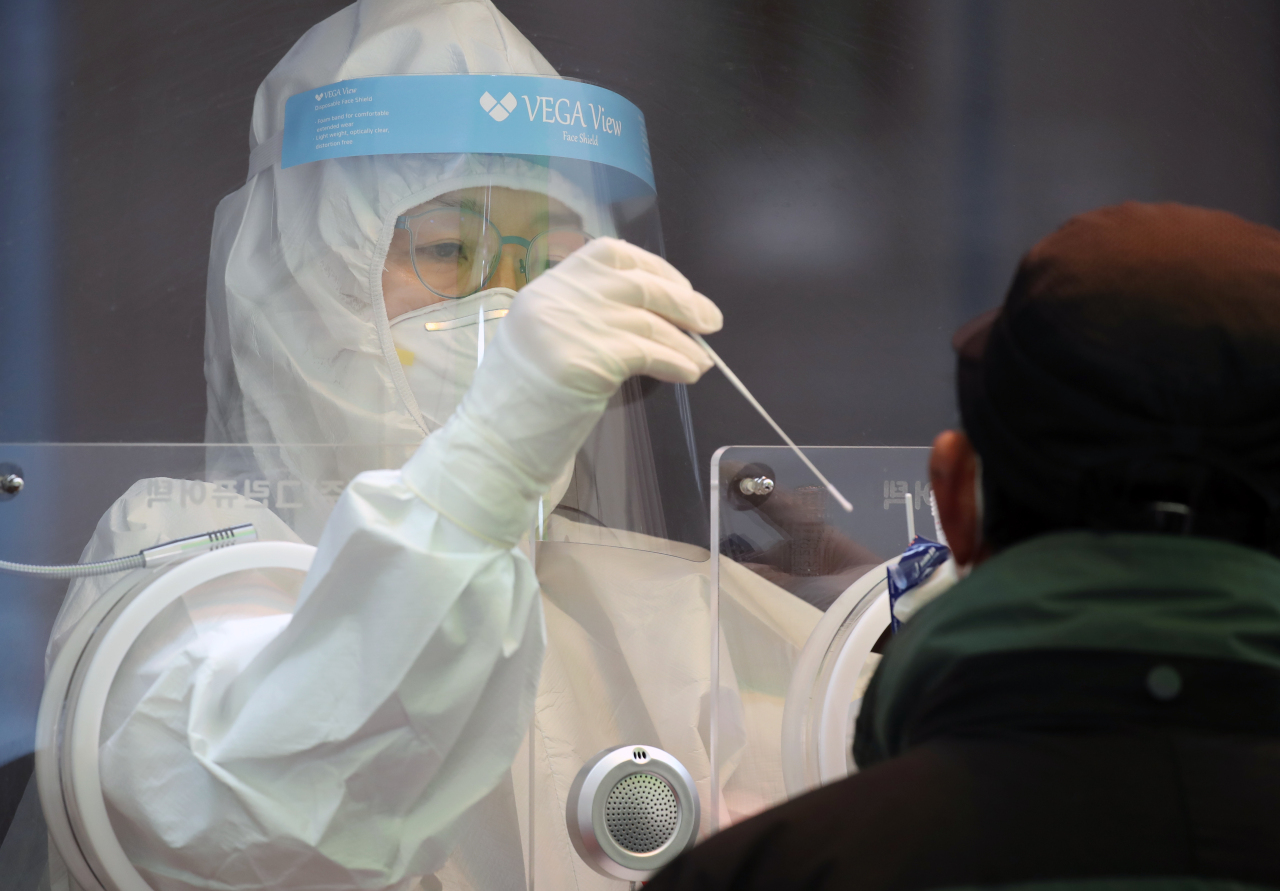
A health care worker at a Seoul testing center performs a nasopharyngeal swab on a patient on Sunday. (Yonhap)
Health experts both inside and outside the government say Korea may be farther away from herd immunity against COVID-19 than previously thought.
Korea Disease Control and Prevention Agency Commissioner Jung Eun-kyeong said Monday that as more contagious variants of COVID-19 and other variables come into play, herd immunity “could take higher rates of vaccinations than the aimed 70 percent.”
In a Jan. 25 briefing to the president, the Ministry of Health and Welfare had said 70 percent of people in Korea will be vaccinated by September, and that herd immunity will be reached by no later than November.
Jung says it is highly likely this timeline is subject to changes.
“Some experts say over 85 percent of the population will need to be vaccinated before the herd is immune,” she told the latest news briefing, adding that these predictions would be continuously updated as the situation evolves.
The herd immunity threshold is also dependent on the R0, or the basic reproduction number, which measures how transmissible a virus is, she said. “A higher R0 means that a higher proportion of the population will need to be immune to stop the spread of the disease.”
Even more menacing is the presence of the new variants, which are capable of rendering the vaccines less effective. Korea has reported all three main variants, discovered in the UK, South Africa and Brazil, respectively. The number of variant cases here is 128.
“The higher the vaccination rates, the better,” said preventive medicine professor Dr. Jung Jae-hun of Gachon University.
“The vaccines that we have now aren’t authorized for use on children under the age of 19, who account for nearly 16 percent of the Korean population. The clinical trials for pregnant women are still underway,” he said.
“By this year’s end or early next year, we will probably need vaccines that have been enhanced to protect against the variants as well. Given these circumstances I would even say Korea should be aiming for 100 percent vaccination.”
Infectious disease specialist Dr. Kim Woo-joo of Korea University said, “It’s an important distinction to be made -- vaccination rate is not the same thing as immunity level.”
“For instance, if everyone is given a vaccine that is 70 percent, that would translate to 70 percent herd immunity. But with a 90 percent effective vaccine, we could get to 70 percent herd immunity with just 80 percent vaccinated,” he said. “In other words, a less effective vaccine means more people needing to be vaccinated in the community.”
The gloomy outlook comes as vaccinations are finally getting started in Korea this week.
Prime Minister Chung Sye-kyun said over the weekend that AstraZeneca jabs will be offered to nursing home residents and staff under the age of 65 from Friday. The government estimates there are about 272,000 people that fit this target group.
Pfizer jabs will be handed out to some 58,000 health care workers taking care of COVID-19 patients starting Saturday. These Pfizer supplies are distributed via COVAX, a World Health Organization-led initiative to enable equitable access to vaccines globally.
Arriving next are Pfizer vaccines for 500,000 people in late March, and then more from Pfizer for 3 million people sometime before July, the prime minister said. Then an unspecified amount of Novavax vaccines is scheduled for delivery between April and June. Moderna and Johnson & Johnson’s Janssen could be shipping their first batches in April or May at the earliest.
To date, Korea has secured enough vaccines to inoculate 79 million people in total, of which the supplies for 10 million people would be coming from COVAX. The rest have been purchased from AstraZeneca for 10 million people, Pfizer for 13 million, Moderna for 20 million, Janssen for 6 million and Novavax for 20 million.
Koreans’ willingness to get COVID-19 vaccines appears to be high. The government survey of 201,464 people eligible for the country’s first jabs showed 93.8 percent saying they would get the vaccines. Although the government hasn’t made taking the vaccine compulsory, once declined, the person’s turn for the vaccine is pushed back until after everyone else in the priority order is vaccinated.
With vaccinations just around the corner, cases are once again on the rise. In the past week, the number of locally transmitted cases averaged 455 a day, up 73 from the week prior. Over 20 percent of all recent patients could not be contact-traced, meaning it is unclear from whom or where they had caught the virus.
The government, however, noted with optimism the number of newly diagnosed patients falling to 332 on Monday, while acknowledging this could be attributed to fewer tests taking place over the weekend.
“The case count has come down to below 400 today from a streak of over-600 days after the Seollal holiday,” said Jeon Hae-cheol, officiating the government COVID-19 task force meeting Monday morning. “Depending on how cases transpire this week, some of the restrictions could be restored to prevent another resurgence from coming our way.”
COVID-19 has sickened 87,324 and killed 1,562 in Korea, according to official statistics. Currently there are 7,875 patients who are in isolation for treatment, of whom 146 are either severely or critically sick in the intensive care units.
By Kim Arin (
arin@heraldcorp.com)






![[Graphic News] More Koreans say they plan long-distance trips this year](http://res.heraldm.com/phpwas/restmb_idxmake.php?idx=645&simg=/content/image/2024/04/17/20240417050828_0.gif&u=)